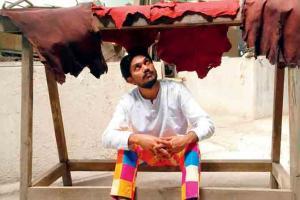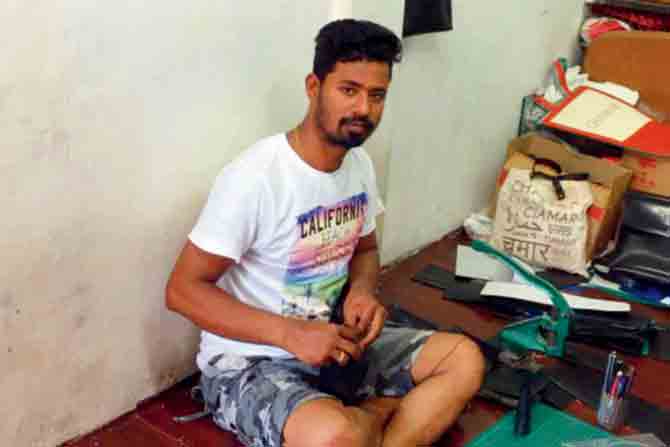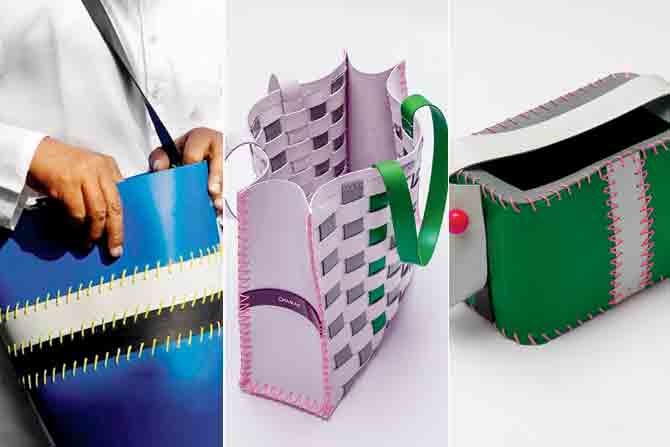A homegrown accessories label with roots in the slums of Kandivli, Vakola and Dharavi, that was once an inspiration for wearing the Dalit identity of its makers proudly, struggles to survive in the face of the lockdown and government apathy

Sudheer Rajbhar, founder of indie accessories label Chamar Studio, will have to dip into his savings to keep homes of the 10 artisans in his team running
It's hard to determine what's going on in Sudheer Rajbhar's mind when he speaks about the effect of the 21-day lockdown on his nascent accessories brand, Chamar Studio. There is relief since his team of artisans works largely from home, but there is the concern of paying them wages while keeping his business afloat. "Social distancing is next to impossible when you live in the slums," says Rajbhar. He'd know. The 33-year-old spent his childhood in the slums of Kandivli East.
ADVERTISEMENT
Rajbhar works with a team of 10, whom he calls "collaborators", all of them residents of Dharavi and shanties in Vakola. "They are working with existing stock, but what happens when they run out? We use recycled rubber which comes from Wada, on the outskirts of Mumbai. I don't know how to gather supplies given the ban on transport. Our only hope is that the lockdown does not extend beyond April 14."
While the industrial threads are sourced in bulk from Crawford Market, the rivets, zippers, sealants and bag handles come from Dharavi. Both markets are shut for business.
Rajbhar's story is representative of scores of other small, self-funded businesses started by young Indians. In fact, Chamar's journey is the ideal Make In India story. Rajbhar, who belongs to the carpenter-painter artisan community native to Rajasthan, works only with local artisans, sources recycled material—rubber in this case—to make bags that sell at one of Mumbai's chicest boutiques. In fact, before the pandemic broke, he was in discussion with vendors in Italy and France for high-quality material. But more than anything, Chamar Studio is significant for the conversation it sparks around social and economic empowerment. Launched in 2018 as a social project with a team of two, Rajbhar hoped it would help celebrate the identity of the Dalit communities. The decision to include his Scheduled Caste identity into the brand name (Chamar refers to tanner/leather worker) was driven by the need to be proud of their roots. That he works with recycled rubber instead of leather, earns the brand five-star sustainable cred. Chamar Studio products are entirely handmade, and include a gender-neutral line of wallets, belts and bags in assorted styles—cross body, satchel and backpack, and bear the crisscross cobbler's stitch.

Sachin Bhima Sakhare, an expert seamster, is part of Rajbhar’s two-member founding team. He spends the morning supervising cleaning and garbage disposal for the BMC, and devotes the rest of the day at his workshop to Chamar Studio.
Sachin Bhima Sakhare, 31, an expert seamster, is part of Rajbhar's two-member founding team. His father ran a successful cobbler shop at Vakola, making small exports of leather sandals and shoes before he passed away in 2003. "I had to take over to support my mother and siblings," says Sakhare, who lives with his mother, wife, two children and a younger brother in a Vakola chawl. To make ends meet, Sakhare, who has studied till Class XI, took up the position of supervisor in the BMC's waste management department. With the ongoing cleanup and sanitisation drive following the Coronavirus outbreak, Sakhare says his mornings are busy. He sets out at 8 am to oversee the staff as they sweep the streets of Vakola, and dispose of garbage. He returns home for lunch, and spends the rest of the day at his makeshift workshop built on the mezzanine, creating products for Chamar Studio. "How much television can you watch?" he laughs about coping with the isolation. "Typically, a family of six to eight shares a small space, and with Mumbai's weather getting warmer, it's impossible to stay cooped up in our homes for long."

Sunil Netke
Sunil Netke, 34, lives and works in Dharavi, which has recorded two COVID-19 deaths in the last week. Teaming with migrants who arrived here to set up home and livelihood, Dharavi is characterised by a litany of unregistered commercial establishments producing garments and leather goods for the domestic and international markets. Here, the overheads are low, and the cost of human labour lower.
Netke's father moved to Mumbai in 1972, and made a living from small orders of leather goods. Netke and his family stayed in Takalsing, a village in Maharashtra, and in 2002, when a young Netke shifted to Mumbai to join his father's business, he was able to up production with orders from Chamar Studio, one among eight brands he works for, including Colaba's famed leather store, Rasulbhai Adamji. He employs a staff of six artisans at his Parsi chawl workshop, while he lives in the adjacent lane at Kala Killa with wife Archana and his seven-year-old son Vendant. "After the lockdown, only Sudheer [Rajbhar] has been in touch, the rest have disappeared. Ekdum bekar haalat ahe (the situation is dire). The seths (vendors) haven't bothered to check how we are doing or if we need monetary help," says Netke.
He is aware that it's going to get tougher here on. "Khup motha problem honar (It will be a huge problem)," he says of the positive cases in Dharavi, "Where will the authorities start from? Ten people live in 100 sq ft kholis. We use a roomal (handkerchief) to cover our faces when we step out, but we still have to use public toilets. Our nagarsevak Ganga Kunal Kadam hasn't visited us so far," Netke says. With little help coming from the government representatives, he believes forming a workers' union would have helped. "At least 400 leather and clothing manufacturers operate around my workshop itself, and most of us supply to big brands in India and internationally. If we had a union, we could have written to our chief minister for help."

Chamar Studio's bags are made from recycled rubber and feature the crisscross cobbler's suture
Like Netke, Rajbhar's artisans receive a monthly payment, or are paid on consignment basis. While they have received their salaries this month, Rajbhar is anxious about managing funds May onwards. "It's like starting all over again. It will be a challenge but I believe nobody has the power to kill the crafts. Most of us don't have another source of income, and I don't have any expectations from the government. I'll have to figure out a way, perhaps dip into my savings, to pay those I work with," Rajbhar admits.
Stocking at South Mumbai's upmarket retail address Le Mill, and India Goods Co. in Frankfurt, before the pandemic broke, he has seen all orders come to a halt. The next best thing is selling from the brand's online store. "The priority right now is to start our e-retail website, which should go live this week. If we receive orders, it will ensure steady work for the artisans and money for their daily ration. We will deliver the orders as soon as courier services are up and running again."
Catch up on all the latest Mumbai news, crime news, current affairs, and also a complete guide on Mumbai from food to things to do and events across the city here. Also download the new mid-day Android and iOS apps to get latest updates
 Subscribe today by clicking the link and stay updated with the latest news!" Click here!
Subscribe today by clicking the link and stay updated with the latest news!" Click here!






